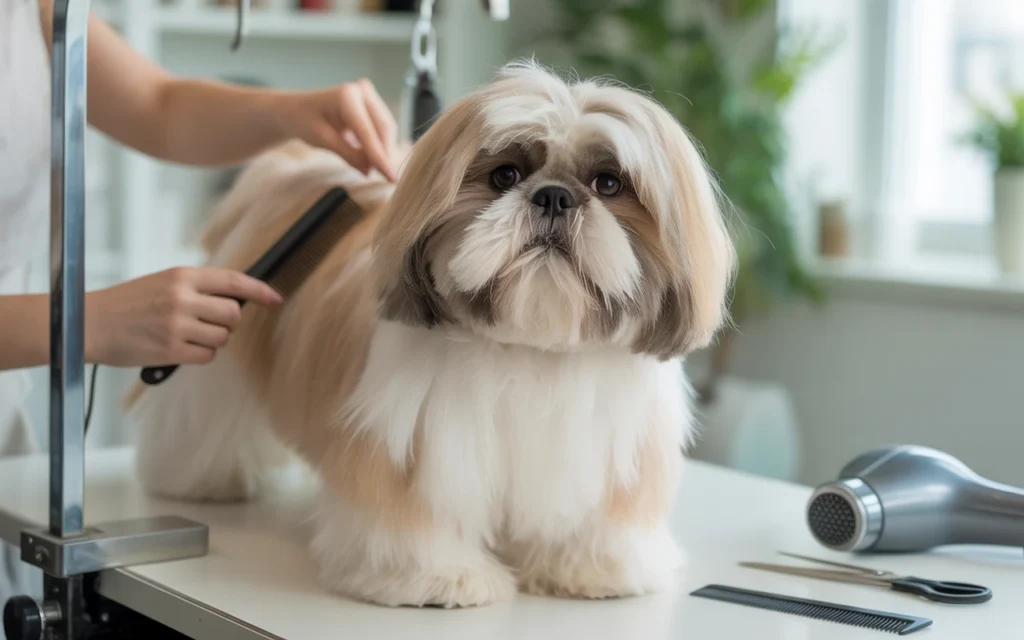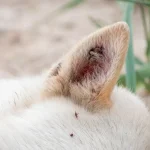Few breeds win hearts as quickly as the Shih Tzu dog. Known for their big round eyes, flowing coat, and cheerful personality, these little companions have been adored by royalty and families alike for centuries. If you’re thinking about bringing one home—or already have a Shih Tzu by your side—this guide will help you understand their temperament, care needs, and lifespan expectancy, along with real-life insights from owners who know them best.

Content
A Quick Look at the Shih Tzu Breed
The Shih Tzu’s roots trace back to ancient China and Tibet, where they were bred as royal lapdogs. Despite their regal origins, these dogs are friendly, affectionate, and thrive in everyday homes.
Shih Tzu breed information tells us they typically weigh between 9–16 pounds and stand about 9–10 inches tall. Their long, double coat is one of their most distinctive features—beautiful but demanding in terms of maintenance.
They are often described as charming, alert, and people-oriented. With proper care and attention, the Shih Tzu lifespan expectancy ranges from 10 to 16 years, though some have been known to live even longer with good diet and regular vet care.
Shih Tzu Dog Characteristics and Temperament
When it comes to Shih Tzu dog characteristics, their personality is truly one-of-a-kind. They are affectionate without being clingy, confident without aggression, and playful without hyperactivity.
Shih Tzus are social and tend to get along with everyone—especially children and other pets. Many owners wonder, “Are Shih Tzu dogs good with kids and families?” The answer is a resounding yes. Their gentle nature and love for companionship make them a perfect choice for families and even apartment dwellers.
They’re intelligent but can be a little stubborn during training. With patience and consistency, they respond beautifully to positive reinforcement.
How Long Do Shih Tzu Dogs Live?
A common question among new owners is, “How long do Shih Tzu dogs live?” On average, 12–15 years is typical, but many exceed that range with proper care.
To support longevity:
- Provide balanced nutrition and portion control
- Schedule regular vet check-ups
- Keep vaccinations and parasite control up to date
- Ensure daily exercise (short walks and indoor play are perfect)
A healthy lifestyle not only extends lifespan but improves quality of life in their senior years.
Caring for a Shih Tzu: Daily Essentials
Caring for a Shih Tzu requires commitment, but it’s also deeply rewarding. Their charming personality makes every bit of effort worth it.
Here’s how to care for a Shih Tzu puppy at home:
- Establish routines early: Shih Tzus thrive on consistency.
- Socialize often: Introduce them to new people, pets, and gentle sounds to build confidence.
- Crate training: This helps with housebreaking and gives them a safe space.
- Regular grooming: Their coat grows continuously, so brushing and trimming are part of life.
A balanced mix of affection, structure, and attention keeps your pup happy and confident.
Read More About: Are Carrots Good for Dogs?
Shih Tzu Grooming Needs

One of the defining features of the breed is its beautiful coat—and with that comes high maintenance. Understanding Shih Tzu grooming needs is key to keeping them healthy and comfortable.
Here’s a grooming routine most owners follow:
- Brushing: Daily brushing prevents tangles and mats.
- Bathing: Every 3–4 weeks with a gentle dog shampoo.
- Face cleaning: Wipe their eyes daily to avoid tear stains.
- Ear & nail care: Clean ears weekly and trim nails every two weeks.
- Professional grooming: Every 6–8 weeks for trims or a “puppy cut” to manage coat length.
Their long hair can trap dirt and moisture, leading to skin irritation if neglected. Shorter cuts are often preferred for busy owners while maintaining the classic Shih Tzu look.
Best Food for Shih Tzu Dogs
A proper diet directly impacts coat quality, energy levels, and overall health. When choosing the best food for Shih Tzu dogs, look for:
- High-quality protein sources (chicken, salmon, lamb)
- Omega-3 and Omega-6 fatty acids for skin and coat health
- Small-breed kibble size for easy chewing
- Avoid fillers like corn, soy, and artificial preservatives
Puppies need multiple small meals per day, while adults do well with two. Always consult your vet before introducing supplements or new diets.
Common Health Issues in Shih Tzu Dogs
Like all breeds, Shih Tzus have some genetic tendencies. Understanding common health issues in Shih Tzu dogs helps you prevent or manage them early.
Frequent concerns include:
- Brachycephalic airway syndrome: Due to their short muzzle, they may struggle in heat or during exercise.
- Eye problems: Their prominent eyes can be prone to dryness or infections.
- Dental disease: Small mouths lead to crowded teeth—daily brushing is crucial.
- Skin allergies: Often linked to diet or environment.
- Joint issues: Patellar luxation (slipped kneecaps) is relatively common.
Regular veterinary check-ups, good nutrition, and weight management are the best defenses against these issues.
Training and Socialization Tips
Training a Shih Tzu requires patience, humor, and love. They’re intelligent but can be strong-willed. Short, fun sessions work better than long drills.
Tips for success:
- Use treats and praise, not punishment.
- Keep sessions short (5–10 minutes).
- Be consistent with commands and rewards.
- Encourage positive behaviors early (like leash walking and potty routines).
Proper training makes living with your Shih Tzu even more delightful.
Real-Life Case Study: “Bella’s Journey to Better Health”
When I first met Bella, a 5-year-old Shih Tzu adopted by a family friend, she was overweight, constantly scratching, and low on energy. Her owners admitted to feeding her table scraps and inconsistent grooming routines.
We started small: switching to a high-quality, small-breed dog food rich in salmon and sweet potato, brushing her daily, and adding short morning walks. Within three months, Bella’s coat regained its shine, her itching subsided, and she lost two pounds—returning to her playful self.
This simple change reminded me how much difference consistent care, proper grooming, and nutrition can make in a Shih Tzu’s life. It’s not about perfection; it’s about routine and attention.
Conclusion
Owning a Shih Tzu dog means sharing your life with a cheerful, loyal, and affectionate companion. From their lively personality to their luxurious coat, every aspect of this breed reflects love and devotion.
By focusing on nutrition, grooming, and regular vet care, you can help your Shih Tzu enjoy a long, happy life—just like Bella’s transformation story proves. Whether you’re raising a playful puppy or caring for a senior, the joy these little dogs bring is truly royal.
If you’re curious about other fascinating cat breeds, check out our detailed guide on the Types of Siamese Cats to learn about their unique varieties and traits.
FAQs
What are the pros and cons of a Shih Tzu dog?
Pros: loving, family-friendly, low-shedding. Cons: high grooming needs and can be stubborn to train.
What is the common problem with Shih Tzu?
Common issues include breathing trouble, eye irritation, and dental disease due to their short muzzle and small mouth.
Why did Shih Tzus almost go extinct?
After China’s imperial fall, the Shih Tzu breed nearly vanished but was saved by a few surviving dogs exported to Europe.
Is a Shih Tzu a good house dog?
Yes, the Shih Tzu dog is calm, affectionate, and thrives in apartments, making it an excellent house companion.

Meet Max, the dog’s best friend. He’s a pup-loving pro, sharing tips on training, grooming, and adventures with our four-legged companions.













